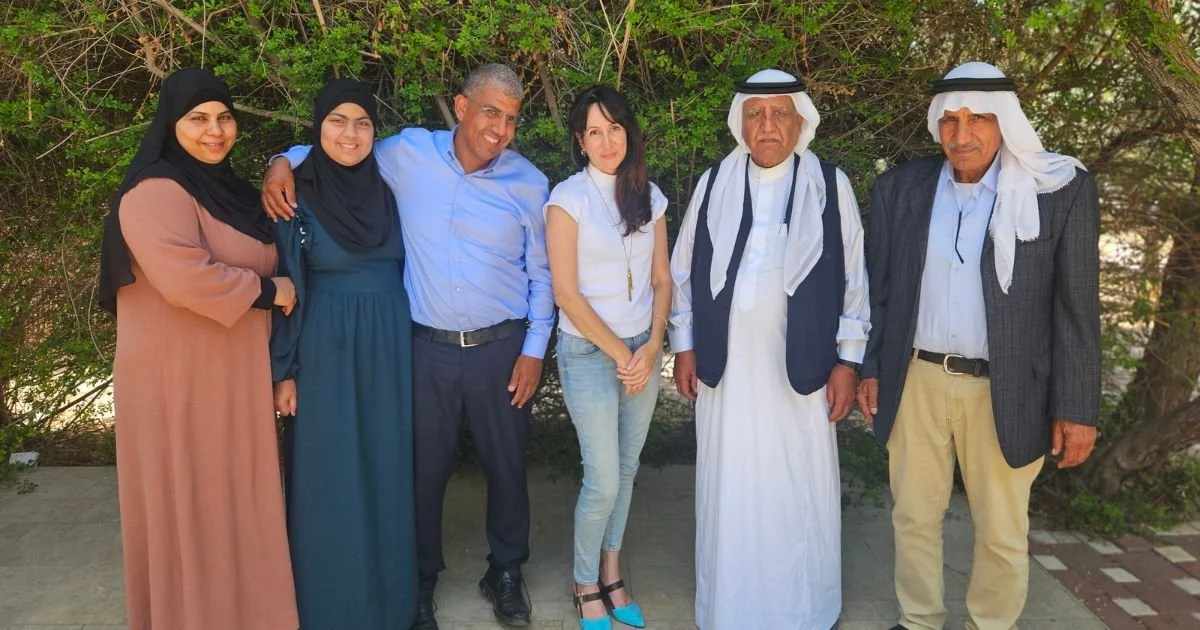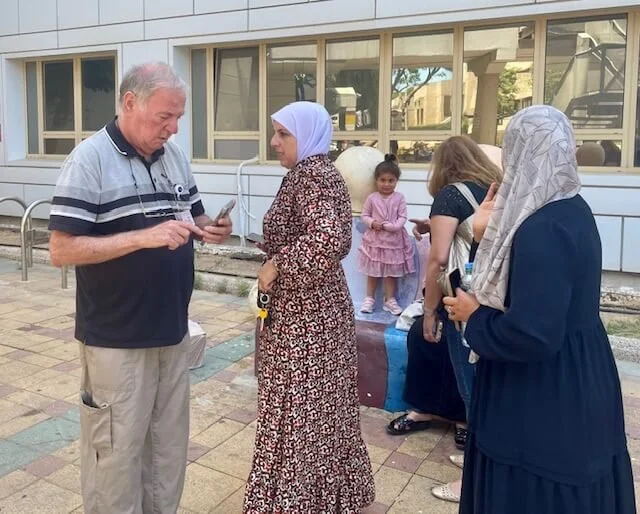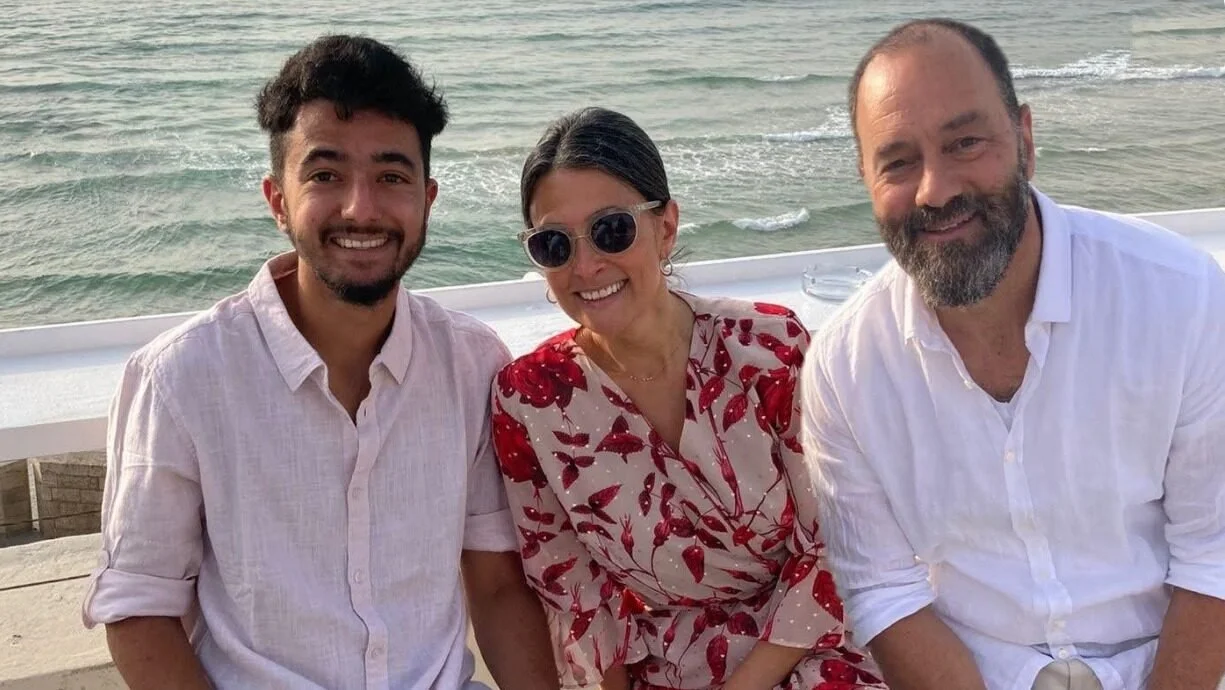On Seeds of Morality
I was recently listening to one of my favorite podcasts called Israel Story. It’s a loving rip off of “This American Life” with Ira Glass, and it’s done more to humanize the people and communities on both sides of the conflict than any other source over the past two years. Recently, they shared a story that took my breath away.
Pazit, an Israeli mother of 4, grew up Orthodox near Tel Aviv. Zionist through and through, she married a man from Qiryat Arba, a settlement outside Hebron, surrounded by checkpoints and tension.
Radwan, a Palestinian father of 6, grew up an observant Muslim in Lod — a mixed city of Jews and Arabs. A devout, conservative man, he even made Hajj to Mecca.
His eldest child, Bayan, was eight when the doctors discovered her kidneys were failing. Her mother donated one of hers, and saved her life…for a while. Unfortunately, years later the kidney began to fail again.
Radwan wanted to donate, but he wasn’t a match. His wife had already given, it was uncommon in the Muslim world to donate, and even less common for a Jew to donate to an Arab. There was no one left and Radwan was feeling the weight of his child’s sickness.
One day, he came to the Lod water company where he served on the board. He carried a sadness too heavy to hide. Pazit, who worked there, asked him what was wrong, and he shared vulnerably about his beloved daughter. Pazit responded, simply: “I will donate my kidney to her.”
Radwan was so stunned he started to cry. From that moment, everything in Pazit’s life changed. She had to schedule tests in Jerusalem, Ashdod, Tel Aviv, Petach Tikva. A summer of endless appointments passed and Bayan was growing weaker by the day. The clock was ticking…
And then — October 7th. In Hamas’ attack on Israel, three of Radwan’s family members were murdered, some of the many Palestinian victims of October 7th. Pazit’s husband was called up out of Simchat Torah celebrations to serve in Gaza. The country froze in trauma. Her neighbors whispered: “Why give your kidney to them? What if a soldier needs it?” It was a delicate time, but Pazit pressed on and finally, the surgery was scheduled.
The night before, they all sat together in the hospital café — her husband in uniform with a rifle, Radwan’s wife and daughter in hijab. People stared, not knowing what they were looking at. Outside, the war raged. Inside, two families sat together, waiting for a surgery that might save a teenage girl’s life.
The next day, Pazit went into surgery and woke up with one kidney. It was successfully transferred to Bayan. As Pazit recovered, one of the Arab doctors came to her room.
“Did you know who are you going to donate the kidney to?”
“yes.”
“Did you know she’s an Arab girl?”
“Yes!”
“So why?”
She couldn’t understand why a Jewish Israeli would help.
Then came a Jewish custodian, who closed the door behind herself and looked at Pazit:
“Can I tell you something?”
“OK.”
“I wouldn’t do it if I was you. All of them, they are Hamas. I’m telling you all of them, they are Hamas.”
There are many reasons – understandable reasons, human reasons – for the Arab doctor and the Jewish custodian to both lack the empathy to understand why a Jewish Israeli woman would help the child of an Arab Israeli Muslim coworker. More important than those reasons, that every one here could rattle off, is accepting that this black and,us versus them behavior is the norm in our world today: “We betray. We are cruel. We scheme. We are violent. We slander. We devise evil. We lie. We corrupt. We commit crimes. We are hostile. We are stubborn. We are immoral. We kill. We go astray. We lead others astray.”
The reason our tradition has us read Ashamnu is not to pound us into self-pity or degrade our self-worth; the opposite. By acknowledging our wrongdoing, by acknowledging our human fallibility, by acknowledging the moments we don’t live up to our own values, by acknowledging when our community and our country and our people don’t live up to our standards – to God’s standards – we draw a line in the sand and say: “We erred, but it can be different – we can be different. There is another way.” We aren't shaming the Arab doctor or the Jewish custodian or anyone who relates to their emotions. But our tradition, our religion, wants us to dream bigger than succumbing to our fears, it wants us to turn us back towards each other instead of turning away, it wants us to build longer tables, not higher walls. Look what's possible when we overcome fear and give ourselves a chance to live out our values. We too can be like Pazit, realizing the Jewish values of pikuach nefesh - of saving a life, of being a rodeph shalom, a pursuer of peace, of treating the ger - the other, the way we ourselves would want to be treated.
Rabbi Donniel Hartman of the Shalom-Hartman Institute writes in his essay Morality in Times of Fear that the core tenant of Judaism, the reason Judaism exists at all, is encouraging moral behavior, elevating ourselves above our animal instincts toward simple self-preservation and connecting us to all of God’s creations. Hartman writes:
Since its inception, Judaism has identified doing what is just and right as the foundation for our covenant with God, and viewed moral behavior as its most important value:
“You have been told, O mortal, what is good, and what God requires of you: Only to do justice and to love goodness, and to walk humbly with your God” (Micah 6:8).
In the Talmud, Hillel the Elder consecrates this idea in his famous principle: “What is hateful unto you do not do to others, that is the whole Torah, and the rest is but commentary. Go and study” (bShabbat 31a).
Moral behavior is not merely central—it is “the whole Torah.” When all is said and done, there is no validity to a Judaism that does not concern itself constantly with the question of how to act in a way that is just and right…
There’s an all-too-human temptation to decide, in times of crisis – as we’ve been in these last few years – that acting justly and compassionately are naive luxuries we can’t afford. Our fear warps our sense of reality and tells us to put the prophet Micah and Rabbi Hillel on hold – just protect our own until the world calms down.
But if we let fear erase our concern for others, if we let our grief blind our morality, if we stop concerning ourselves with the question of how to act in a way that is just and right — then we lose the very heart of Judaism.
Thirty years ago, on October 15th, 1995, Buma Inbar’s son Yotam was killed in Lebanon. His profound grief, that he still can’t talk about 30 years later without choking up, didn’t lead him to harden his heart and hate the other. Instead, “meetings with bereaved Palestinian mothers really broke [him]. All of a sudden, [he] encountered the pain that was so familiar from home” in the pain of Palestinian parents who also lost their children. His grief led him to co-found Israeli-Palestinian Bereaved Families For Peace.
He didn’t let his trauma turn him inward, remarkably it turned him towards others, toward building bridges. For many years now, he has helped Palestinians get medical care in Israel and provide them with supplies they needed during their treatments. “In all the Middle East, no country treats more Palestinian children than Israel,” he proudly says. “They are treated just like our own children here no matter their gender, nationality, religion or race.” Since October 7th, however, very few Gazan patients have been granted permits to get treatment in Israel. And if they are lucky enough to be granted access, the patients and their families are mostly confined to the campus of the hospital, often for months. The hospital provides food for the patients, like any hospital, but their families can’t go home or leave the hospital grounds to get food.
So…Buma brings it. Week after week, often twice a day, an old Jewish Israeli hauls bags of groceries and prepared foods for the families of ill children to eat. As he said in a Hebrew language interview,
אני לא איש הדיבורים - I am not a man of words , אני איש המעשים - I am a man of actions
Look what's possible when we overcome fear - We too can be like Buma, people of action healing the world.
And then there is Rachel Goldberg-Polin. Many of you know her name. Her 23 year-old son Hersh was taken hostage on October 7, held captive for a year and then brutally murdered. She wrote this poem as Hersh was captive and still alive, but hasn’t changed her tone since she buried him:
There is a lullaby that says your mother will cry a thousand tears before you grow to be a man.
I have cried a million tears in the last 67 days.
We all have.
And I know that way over there
there’s another woman
who looks just like me
because we are all so very similar
and she has also been crying.
All those tears, a sea of tears
they all taste the same.
Can we take them
gather them up,
remove the salt
and pour them over our desert of despair
and plant one tiny seed.
A seed wrapped in fear,
trauma, pain,
war and hope
and see what grows?
Could it be
that this woman
so very like me
that she and I could be sitting together in 50 years
laughing without teeth
because we have drunk so much sweet tea together
and now we are so very old
and our faces are creased
like worn-out brown paper bags.
And our sons
have their own grandchildren
and our sons have long lives`
One of them without an arm
But who needs two arms anyway?
Is it all a dream?
A fantasy? A prophecy?
One tiny seed.
The generosity of Pazit, the dedication of Buma, the poem & spirit of Rachel might leave us wrestling — like that Arab doctor or the Jewish custodian — with how such things are possible. How people who have every reason to be cynical, every reason to be angry, every reason to wall themselves off and turn away from obligation, instead leaned in. How they reached out their hand — across fear, across grief — and chose to concern themselves with what is just and right; they chose to do justice and to love goodness, and to humbly walk with God; they chose to not do what is hateful unto others; they chose to plant tiny seeds of hope.
The Hebrew word for seed – zera זרע – is also the word for offspring. What we plant now is not only for ourselves — it is the world our children and grandchildren will inherit.
The Talmud tells the story of Ḥoni the Circle-Maker, who once saw a man planting a carob tree. When Honi asked, “Do you expect to live long enough to eat its fruit?” the man replied, “I found a world full of carob trees. Just as my ancestors planted for me, so I am planting for my descendants.”
That is our charge for 5786: in moments of cynicism, of doubt, of siloing ourselves in, to instead plant a tiny seed. To plant not only for ourselves, but for all of God’s creatures, and most importantly, for those who come after us. To plant seeds of peace, of love, and of justice. To plant even when the ground feels hard, even when the conditions tell us to wait, even when our eyes are blurred with tears from all the seeds that never grew.
Though we have sown with many tears over the past two years, we cannot give up hope that our children and our children’s children will reap those tiny seeds of peace and love and justice in joy.
To a year of blossoming hope - G’mar Chatimah Tovah.


